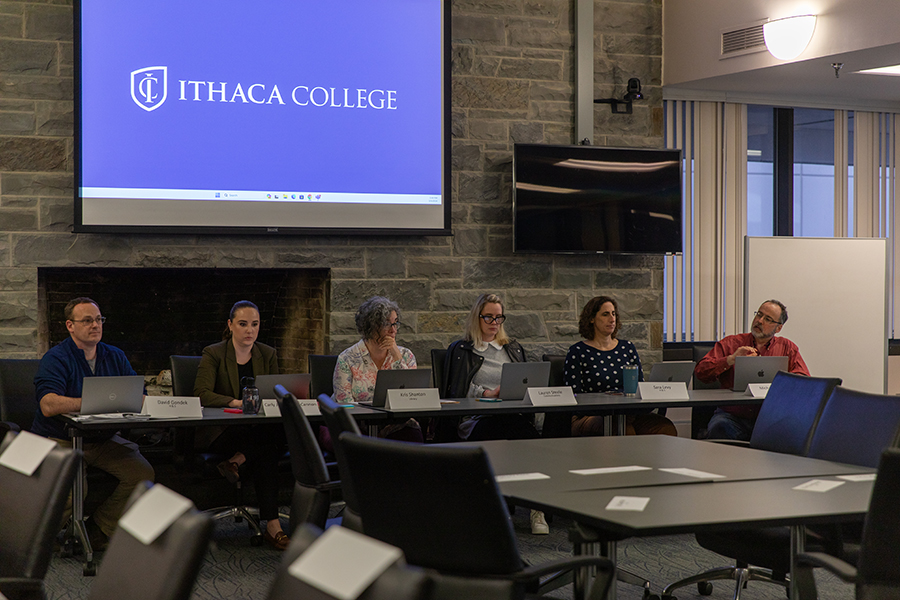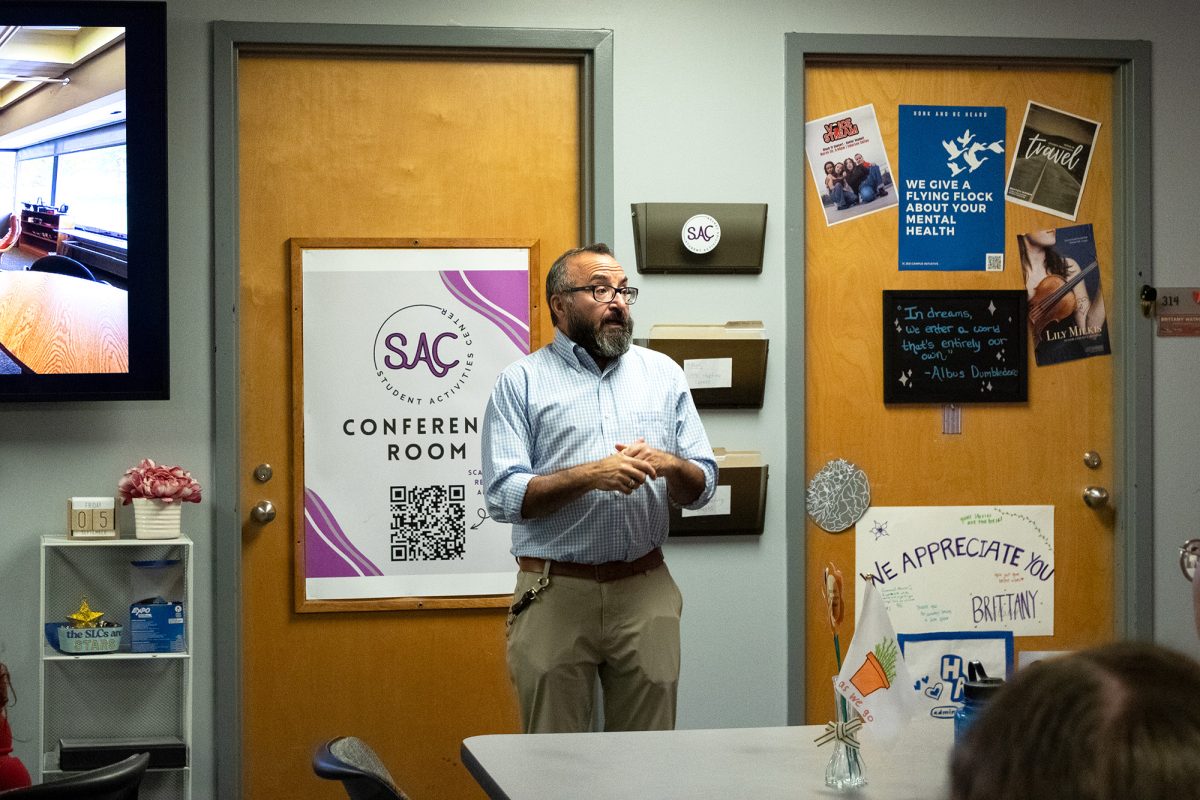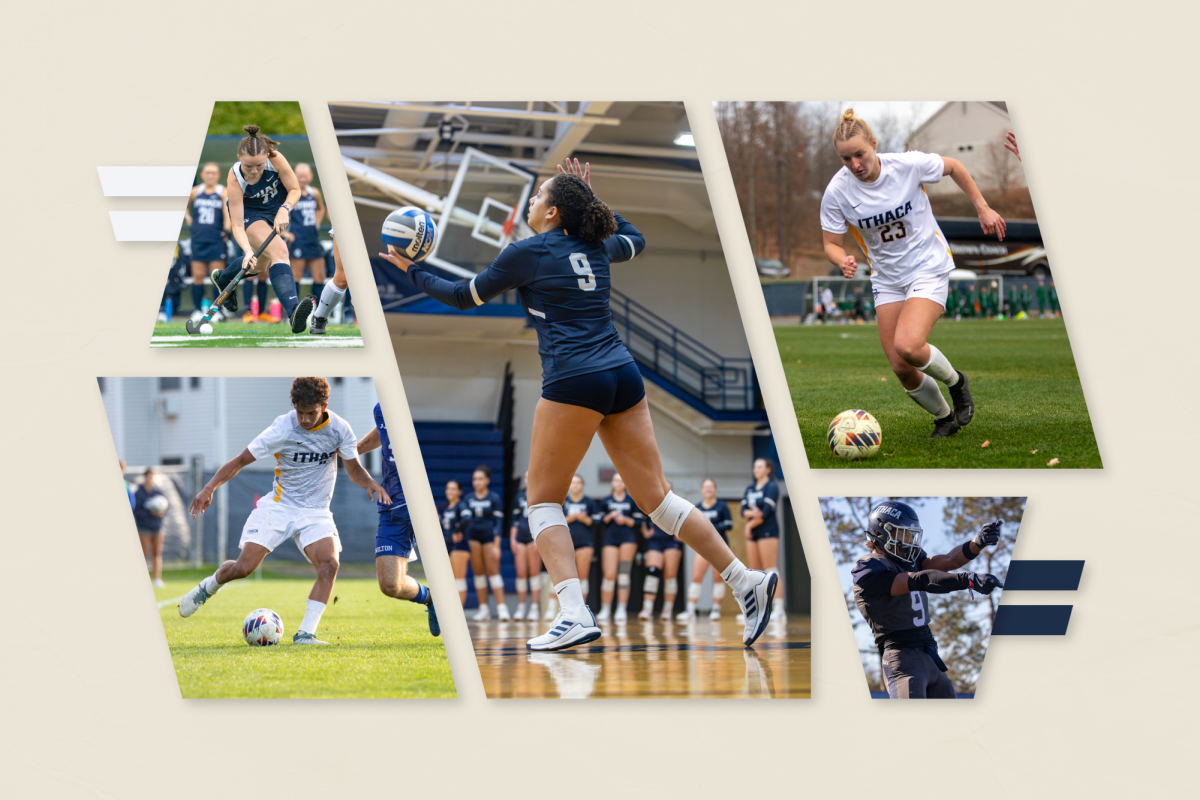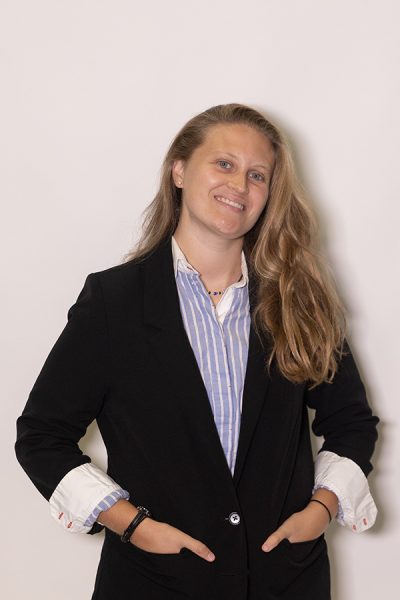Ithaca College’s Faculty Council discussed low salaries for faculty members and how AI changed the college’s plagiarism policy at its March 5 meeting. The council also heard the provost’s report from Melanie Stein, provost and senior vice president for academic affairs, and heard updates about the Student Statement Committee from David Hajjar, associate professor in the Department of Speech-Language Pathology and Audiology.
Provost’s Report
Provost Stein began by speaking about the faculty council’s new ombuds team to help determine how to resolve conflicts and bring concerns about the council to the college’s attention. Stein said the team has office hours meetings, Tuesdays 3–4 p.m., Wednesdays 3–4 p.m. and Thursdays 1–2 p.m.
Stein also gave an update from the Educational Technologies Advisory Committee. The Student Response Systems subcommittee sent a Qualatrics survey in Fall 2023 about potential student response systems to be integrated within Canvas of three possible systems. The provost said the subcommittee recommended iClicker once they concluded their research, which was accepted and has been budgeted into the incoming year.
Stein said salaries have been low for all faculty members across the college. She said that in comparison to other colleges similar to the college in terms of geography and the type of institution, the college is estimated to be several million dollars off from the median.
According to the approved 2023–24 fiscal year budget, the college is expected to spend $97,067,400 on employee expenses compared to $93,359,556 on employee expenses in the 2020–21 fiscal year.
Stein said she has been working on a project in collaboration with other members of the President’s Cabinet to mitigate the low salaries and said part of the budget proposed to the board of trustees in May will include funding for the project. Stein said half of the funding will be distributed to all faculty and the other half will be allocated to the deans to distribute to faculty at their discretion. The project will focus on addressing market pressures and equity issues.
“I did want to let you all know that we are actively working on the faculty salary letters because we hope to have those in a more timely manner and in a concise way that gives you all the information about your salary,” Stein said. “So we are building all of this, not the numbers yet, but this is the template into the faculty salary letters.”
Stein concluded the provost’s report and said the allocation of the funds for the project have not been allocated yet and is pending May approval. She also said the dollars and cents presentation will be held March 14, during spring break.
Update to Plagiarism/Misconduct Policy
The council moved to a discussion about a change in the plagiarism and academic misconduct policy in regard to AI. Carly Jo Hosbach-Cannon, associate professor and graduate program chair in the Department of Speech-Language Pathology and Audiology, said the policy change would view generative AI — like ChatGPT — as the person whom a student is plagiarizing.
Hosbach-Cannon said the terms within the policy change are intentionally vague to give autonomy to faculty in how they handle disciplining and acting upon a student using AI on an assignment. She said that while ChatGPT is a generative AI, other forms of AI faculty members use like Turnitin, which compares information in a student’s work to determine if anything was taken directly from the internet, are non-generative.
“The policy focuses on generative AI, not all AI,” Hosbach-Cannon said. “There is a difference in Turnitin, in my understanding. So we’re focusing on AI that is generating information from a prompt as opposed to AI like Turnitin that is AI that checks for plagiarism.”
Mejda Bahlous-Boldi, associate professor and investment program director in the Department of Finance and International Business, said faculty members must learn how to use AI in their teaching. Bahlous-Boldi said instructors can give oral exams to limit students’ possible use of AI.
“It’s like a class I teach where students solve problems with a calculator and it’s basically telling them to solve all the problems without the calculator,” Bahlous-Boldi said. “We must not penalize them for acknowledging the future.”
Credit Hour Policy
During the meeting, David Gondek, chair of the faculty council and associate professor in the Department of Biology, said sections IV and V of the Credit Hour Policy have limitations about the rigor of asynchronous classes. Gondek also said there are inconsistencies of the language in IV and V. He said section IV discusses courses over the 200 and 300-level, while section V discusses all courses above the 100-level. Stacia Zabusky, associate provost, academic programs, Provost And Academic Affairs, said the change would be made and that she would speak with the registrar about the current scheduling limitations in the policy.
The faculty council voted on adding sections IV and V to the credit-hour policy with the amendments the council made during open-discussion about the topic.
Update to Faculty Handbook
After the vote, the council discussed an update to the procedures document in the faculty handbook regarding promotion from associate professor to full professor and tenure. Stein said the document was updated to explain what can change in a file for a faculty member’s peer reviews after it has been submitted.
“When you’re going up for [full professor], you are putting into Part I all of the things that have happened since your file was submitted,” Stein said.
Stein spoke about the scenario of a faculty member that may go up for associate professor and put a review in their file that is in progress and has not yet been approved for publication.
“It’s not double-dipping, basically to have something that was in progress for the first time and then the second time, it is now in its final state,” Stein said. “So of course you can put it in your file the second time.”
The provost said faculty members eligible for tenure will need to provide six reviews over the course of their time at the college. Stein said faculty members should have two reviews by their second year review, two more reports for the peer review, and two more for the tenure review to have six in total by the time a faculty member can be tenured.
Student Statement Subcommittee
Hajjar concluded the meeting with a presentation about the Student Statement Committee. Hajjar spoke about standardizing the evaluations students are expected to fill out at the end of each semester.
Hajjar said he and the subcommittee looked at student statements from across 25 to 30 departments and what questions they asked, what the Likert scales asked and how many questions there were.
Hajjar said the subcommittee has been discussing pairing questions down from 20 to eight. Hajjar said the subcommittee also discussed alternative designs to the questions asked in student statements to be redirected to the learner and to take the focus off the instructor.
“Instead of, ‘Did the instructor explain concepts clearly?’ change it to, ‘Were concepts presented clearly?’” Hajjar said. “So that’s kind of an example of trying to take some of that focus off the instructor.”
The faculty council reminded schools to end their faculty council elections by April 23. The council’s next meeting will be 5–7 p.m. April 2 in the Taughannock Falls room.
Correction: A previous version of this article stated half of the earmarked funds in the provost’s plan would go to the deans of the college. The deans of the college will have license to the funds to distribute to faculty within their schools. Funds will not go into the deans’ salaries.
















